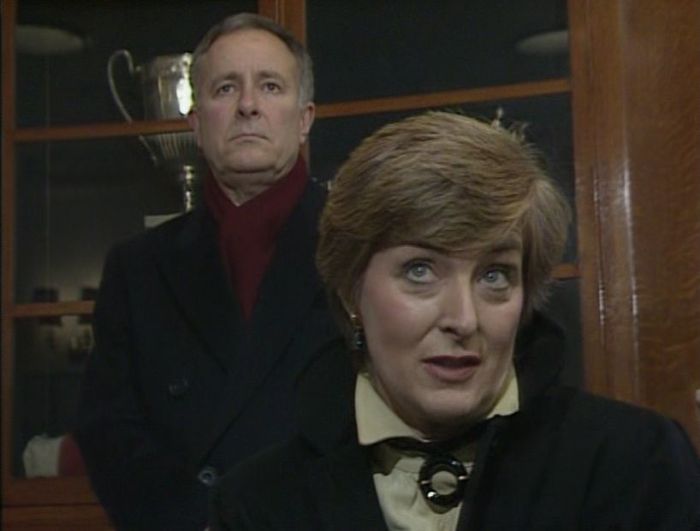
The first episode of the series proper, it’s plain within the first few minutes of Once Your Card Is Marked that some retooling has gone on since the Storyboard pilot (which I need to write a few words about sometime).
Mr Palfrey (Alec McCowen) has been stripped of his swanky high-tech office and instead is now working from a rather pokey room very close to Westminster. The heating doesn’t work, there’s terrible modern-ish art on the wall and he’s forced to share a secretary – Caroline (Briony McRoberts) – with some of the other inhabitants. We never discover who they are – need to know, of course.
The Palfrey of the Storyboard pilot was fairly autonomous, so the fact he’s now given a new and domineering boss, known as the Co-Ordinator (Caroline Blakiston), and an assistant – the strong and taciturn Blair (Clive Wood) – are signs that his wings are being clipped. But having said that, the move to Westminster is presented as a promotion not a demotion, although since this is a spy series it’s probably wise to parse every statement (however innocent seeming) for alternative meanings.
The Co-Ordinator comes across a fairly unsubtle Mrs Thatcher analogue. And even though the concept (and indeed the name) seems to hark back to Callan‘s Hunter, the byplay and one-upmanship between McCowen and Blakiston remains highly entertaining throughout the episode.
One of the most intriguing things about Once Your Card Is Marked is the way that on first viewing it looks to have a major flaw. Namely the fact that the Co-Ordinator appears to have shown a massive error of judgement in assigning Palfrey to investigate Springer (David Buck), a man suspected of passing secrets to the Russians during his Embassy residency in Prague.
The Co-Ordinator is convinced that Springer is guilty and makes it clear to Palfrey that his job is simply to confirm this as quickly as possible. But the stubborn Palfrey continues to dig until the messy truth is revealed ….
One death later, the Co-Ordinator blames Palfrey for this debacle (if only he’d followed her instructions then there would have been no need for such extreme measures). But did she genuinely believe that Palfrey would be compliant right from the start or was the whole operation designed to produce this very effect? Now that Palfrey has learnt what happens when he pursues his own agenda, possibly he’ll be easier to control.
Either of these two readings are valid, which I tend to feel was a deliberate move on George Markstein’s part.
McCowen is tremendously watchable throughout. Decades after my memories of the specifics of the episodes had faded, my recollection of Palfrey – master of the knowing stare – remained strong. David Buck is good value as the twitchy Springer whilst Valerie Holliman – later a London’s Burning regular – has a pivotal role as Susan (Springer’s devoted girlfriend). Alan McNaughtan and David Quilter bulk up the quality of the guest cast a little more – both their characters serve as decent red-herrings.
Given Markstein’s involvement with Callan, it’s not too surprising that this episode has some strong Callan echoes (most notably when Palfrey brushes up against a mysterious and ruthless ‘Section’ that doesn’t officially exist).
A shame that George Markstein only wrote one further episode as he really seemed to have nailed the world of Palfrey even this early on. The previous time I rewatched the series I had a faint air of disappointment that the remainder of the run didn’t quite match the Storyboard pilot and this opening episode. Maybe this time around I’ll have a different opinion …


